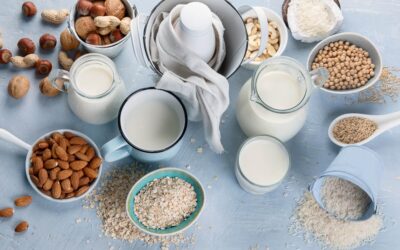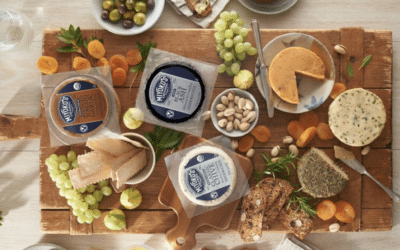You’re on your third grocery store run in the time of COVID-19. Fingers crossed, you stride toward the back of the store to the refrigerated meat and dairy section. Gone. All gone. You stand paralyzed in frustration and awe for a few seconds, wracking your brain for what you can eat. Then, you remember the colors you barely registered as you zoomed past the produce section on your way here. Yes, there were still plenty of fruits and vegetables piled high. Maybe, it’s time to give that plant-based thing a try?
We’re living in a time of uncertainty, but there are certain things we can do to take back our control. A dairy-free, plant-based diet is one of the most cost-efficient, healthful, and accessible ways to eat right now (and in the long-term). You’ve heard of it, perhaps you’ve even considered giving it a try. Well, there’s no time like the present to commit. Trust us, it’s not worth driving to four different stores for cows’ milk—just get the shelf-stable plant milk at the first stop.
Plant-Based Foods You Can Still Find In Stores
Let’s talk about the issue that is on everyone’s mind during COVID-19: accessibility. While meat, eggs, dairy, canned items, and frozen goods may be out, most grocery stores are still stocked with produce. Plant-based foods contain an abundance of not only macronutrients but crucial micronutrients and antioxidants, which help keep your cells healthy and equipped to fight off any potential infections. In fact, a whole foods, plant-based diet is 64-times more antioxidant-rich than an animal-based one.
Stock your cart with:
Dark, leafy greens (kale, bok choy, and collard greens) for calcium
Spinach for iron
Citrus for vitamin C
Bananas for potassium
Broccoli and edamame for protein
Potatoes and squashes for satiety and vitamins A-K.
Worried about protein? Don’t be. All whole foods contain protein, and if you eat enough calories, you’ll hit your quota. While we recommend eating a variety of foods, if it came down to it, if you only ate 2,000 calories of broccoli, you’d still get 146 grams of protein.
Beyond the produce section, check the aisles and perimeter for the following:
Shelf-stable or refrigerated plant milk (soy, almond, cashew, oat, rice, hemp, flax, coconut, etc)
Tofu, jackfruit, and tempeh
Tahini or plant-based sauces (barbecue, peanut, black bean, salsa, hummus, etc)
Nutritional yeast (for a cheesy flavor)
Nuts and seeds
Familiar dairy-free alternatives (dairy-free ice cream or plant-based cheese)
You don’t have to only eat salad and potatoes on a plant-based diet—while their animal-based versions may be out, dairy-free alternatives are relatively still in stock. Make sure your diet is rich in plants, but if familiarity helps you get through this COVID-19 time, go ahead and reach for those dairy-free cheeses, sweets, creamers, yogurts, and butter. Check out our Ultimate Guide to Dairy-Free Alternatives here.
Budget-Friendly Plant-Based Foods
We recognize that cost plays a factor in food choices now more than ever. Fortunately, a dairy-free, plant-based diet is the most affordable option at the supermarket at all times, not just during COVID-19. Basics—apples, bananas, mixed greens, onions, broccoli, potatoes, squash, eggplant, tofu, plant milk, beans, grains, tomatoes, etc—are typically under $1-2 per pound. Hamburger meat at Walmart.com is $5.24 per pound. To get the most out of your dollar, limit your purchasing of convenience foods (buy the whole butternut squash instead of the pre-cubed package). Plant-based food in its origin is pauper food—think ratatouille, beans and rice, and vegetable soup. Modern-day has elevated these struggle foods into meals that are delicious and satisfying. Once you try a sticky-sweet roasted sweet potato topped with refried beans, fluffy quinoa, salsa, and a side of steamed broccoli, you might just be surprised how often you’ll crave it.
Plant-Based Foods That Protect Our Health
Ultimately, what we eat needs to serve our bodies, and plant-based foods are our best protectors. These foods can fight inflammation and strengthen our cells to boost our overall immune function, which is crucial during COVID-19. They provide nutrients and fiber well beyond that of animal-based foods, keeping us regular and energized. Finally, plant-based foods are not laced with the detrimental side effects of dairy and other animal foods such as large amounts of trans and saturated fats, bovine hormones (yes, all cows’ milk contains hormones, even the grass-fed varieties), cholesterol, IGF-1, and foreign compounds like Neu5gc that promote inflammation. Yes, dairy does contain some nutrients, but consuming dairy for calcium or protein is like eating fruit-flavored gummy snacks for their vitamin C content—there are better ways.
Simple, Affordable, & Satisfying Recipes
Let’s shift back to that moment where you’re struck with indecision fatigue in front of the empty meat or dairy case. What do you eat now? Pin these super simple recipes, head to the produce aisle, and get excited. You’re about to try this plant-based thing.
Tomato, Cucumber and Tofu Feta Salad
15-Minute Colorful Veggie Stir-Fry
BBQ Tempeh Soul Food Protein Bowl
Colorful Fiesta Salad Bowl
Easy Mexican Tofu Scramble
Nutty Caramelized Banana Oatmeal
Homemade Oat Milk
Farmers’ Market Spaghetti Squash Pizza








